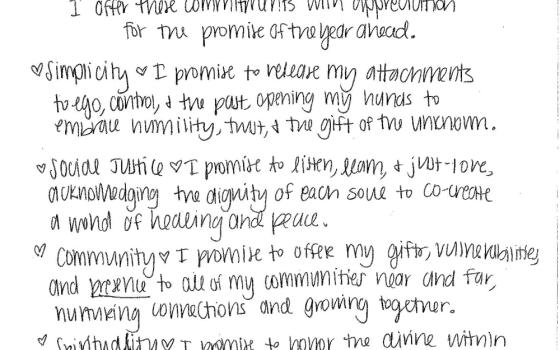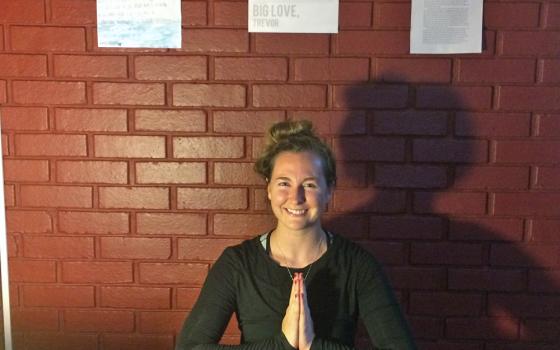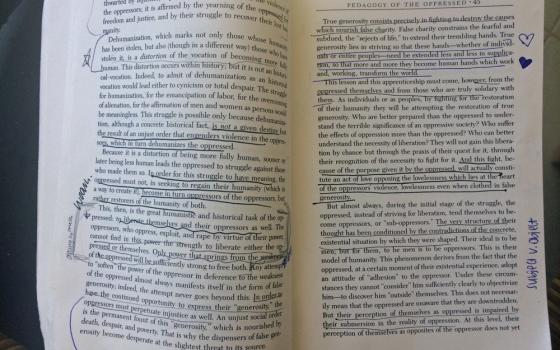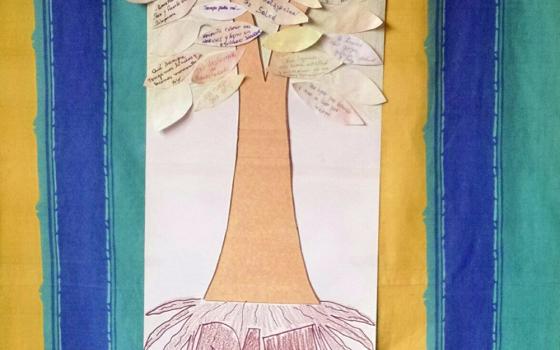Notes from the Field includes reports from young people volunteering in ministries of Catholic sisters. A partnership with Catholic Volunteer Network, the project began in the summer of 2015. This is our fifth round of bloggers: Katie Delaney is a Good Shepherd Volunteer with the Fundación Madre Josefa (Mother Joseph Foundation) in Santiago, Chile, and Lauren Magee is a Good Shepherd Volunteer at Hands of Hope, an income generating project that provides dignified employment for villagers living with HIV/AIDS in Nong Khai, Thailand.
______
Simplicity. Community. Spirituality. Social justice. Of these four tenets of the Good Shepherd Volunteers program, the fourth was the one I felt most drawn to when I completed my application around this time last year.
At that point, I understood social justice to be like a verb: active and outward-oriented. The phrase brought to mind scenes of various volunteer projects, fundraising efforts, political rallies and protests, images supported by my particular context at that point in my life. After a year and a half of intense introspection in my master's program in leadership at St. Mary's College of California, I felt inspired to get into the field and get to work.
My passion to hit the ground running came up against a pretty big wall upon my arrival to Chile. As I wrote previously, I knew we were going to create my role with the Fundación Madre Josefa (Mother Joseph Foundation) over the first few weeks. Even with this awareness, I felt discouraged and a bit hopeless when I felt I wasn't making an impact.
But those weeks without an official "job" weren't just challenging because I wanted to serve and didn't know how to do so. When it came down to it, my service toward social justice had become a personal security blanket. If I was doing good work in the world, then that meant I was a good person. Without a clear purpose and without a job to be done, what worth did I have?
The question was problematic on a number of levels. For one, I had placed my value as a human being in service, something outside of myself and something I had to accomplish. If my worth really depended on this, I would never truly be at peace. What's more, this also meant that my worth depended on the presence of some need in the world. How could I honestly be working for social justice if my worth relied on the existence of social injustices?
As my first post goes on to say, after more patience and conversations, eventually we did find a role for me within the foundation. But my question during that time, particularly as it related to my understanding of social justice, remained in my heart, yearning to be explored.
For starters, I knew I needed to find sources of personal gratification and self-fulfillment beyond my service. Returning to my favorite self-care practices of yoga, journaling, and practicing my spirituality allowed me to reconnect with the peace within myself, providing me with a surplus to share with others. Rather than a luxury in life, I was reminded that self-care is an essential component of my personal well-being and professional sustainability.
I also knew I had to re-examine my motivations for believing in and working toward social justice. With the help of Pedagogy of the Oppressed by Paulo Freire, I found inspiration: "False charity constrains the fearful and subdued, the 'rejects of life,' to extend their trembling hands. True generosity lies in striving so that these hands — whether of individuals or entire peoples — need be extended less and less in supplication, so that more and more they become human hands which work and, working, transform the world. This lesson and this apprenticeship must come, however, from the oppressed themselves and from those who are truly solidary with them."
It was humbling to realize that even after two years of service with the Lasallian Volunteers and a master's degree in leadership that emphasized co-leadership via collaboration, my distress over not having a role at the start of my Good Shepherd Volunteers year quickly became self-centered. I became focused on my purpose as solely helping "the other" without consideration for the fact that I, too, needed help. With Freire in mind, my new intention became to approach social justice as a dynamic relationship with others: a way of honoring our collective humanity by supporting each other to live better, freer lives.
Although it was challenging and even felt self-indulgent or counterproductive at times, my journey to the heart enabled me to return to the action of social justice with a renewed energy and motivation. In March, I started facilitating a new class with the foundation, Raíces de La Paz — Roots of Peace. With yoga, art, writing, meditation and conversation, a group of 20 women and I are working together to develop self-care practices and cultivate inner peace among a community of solidarity. Planting roots of peace in our hearts and souls may yield fruits of love, compassion, forgiveness and hope in our homes, communities and the world beyond.
This has been my social justice education over the past seven months. Both widely systemic and deeply personal, for me, this tenet has grown to require commitment to a purpose beyond myself as well as commitment to look honestly within. On the journey to justice, I still have so much to learn. I'm grateful I don't go it alone.
[Katie Delaney is a Good Shepherd Volunteer in Santiago, Chile.]




